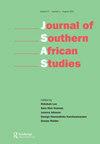“当然不是!”这是马加拉加迪人的一种疾病:贝川纳保护国巴克维纳保护区地方性梅毒的种族化
IF 0.7
4区 社会学
Q2 AREA STUDIES
引用次数: 0
摘要
最近关于全球健康和非洲传染病威胁的历史研究着眼于感染生态学、疾病轨迹、殖民干预以及疾病对不同地理景观和文化反应中的当地社区的影响。一个特别有价值的分析途径探讨了殖民地抗梅毒计划的种族偏见,主要着眼于性传播的梅毒。作为这项工作的出发点,本文研究了南部非洲非性病密螺旋体病的历史,重点是殖民地博茨瓦纳的巴克韦纳保护区(现为奎能区)的地方性梅毒(ritshuswa)的种族化。这篇文章以博茨瓦纳国家档案馆和记录服务处的殖民地报告和信件、世界卫生组织的报告、早期传教士和旅行者的叙述以及当地临床医生和研究人员A.M.Merriweather博士的论文为证据,Merriweaher博士研究了巴克维纳保护区的地方性梅毒。目的是通过在社会经济不平等的历史背景下对茨瓦纳主流社会和少数民族之间的权力关系进行批判性分析,了解地方性梅毒的人类生态学。本文章由计算机程序翻译,如有差异,请以英文原文为准。
‘Certainly not! … It is a disease of the Makgalagadi’: The Ethnicisation of Endemic Syphilis in the Bakwena Reserve, Bechuanaland Protectorate
Recent historical work on global health and the threat of infectious disease in Africa has looked at the ecology of infections, disease trajectories, colonial interventions and the impact of disease on local communities in varied geographic landscapes and cultural responses. A particularly valuable avenue of analysis has explored racial prejudices of colonial anti-syphilis programmes, largely looking at sexually transmitted syphilis. As a point of departure from this work, this article examines the history of non-venereal treponematoses in southern Africa with a focus on the ethnicisation of endemic syphilis, or ritshuswa, in the Bakwena reserve (now Kweneng district) in colonial Botswana. The article uses as its evidentiary basis colonial reports and letters located at the Botswana National Archives and Records Services, World Health Organisation reports, early missionary and travellers’ accounts and the thesis of Dr A.M. Merriweather, a local clinician and researcher who addressed endemic syphilis in the Bakwena reserve. The aim is to understand the human ecology of endemic syphilis through a critical analysis of power relations between Tswana mainstream society and ethnic minorities within the context of a history of socio-economic inequalities.
求助全文
通过发布文献求助,成功后即可免费获取论文全文。
去求助
来源期刊

Journal of Southern African Studies
AREA STUDIES-
CiteScore
1.40
自引率
0.00%
发文量
73
期刊介绍:
The Journal of Southern African Studies is an international publication for work of high academic quality on issues of interest and concern in the region of Southern Africa. It aims at generating fresh scholarly enquiry and rigorous exposition in the many different disciplines of the social sciences and humanities, and periodically organises and supports conferences to this end, sometimes in the region. It seeks to encourage inter-disciplinary analysis, strong comparative perspectives and research that reflects new theoretical or methodological approaches. An active advisory board and an editor based in the region demonstrate our close ties with scholars there and our commitment to promoting research in the region.
 求助内容:
求助内容: 应助结果提醒方式:
应助结果提醒方式:


